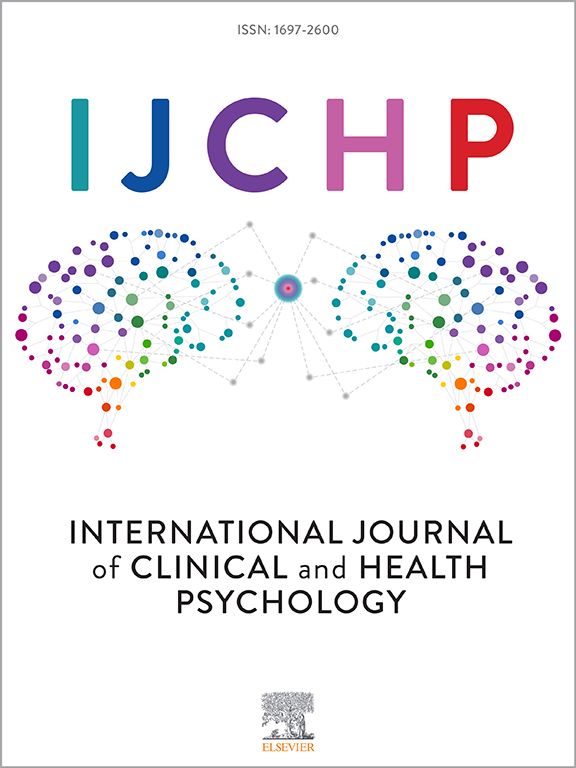比较比较:社会和时间比较的跨诊断调查及其对心理健康结果和福祉的差异影响
IF 4.4
1区 心理学
Q1 PSYCHOLOGY, CLINICAL
International Journal of Clinical and Health Psychology
Pub Date : 2025-07-01
DOI:10.1016/j.ijchp.2025.100611
引用次数: 0
摘要
虽然社会比较与心理健康之间的关系已被广泛研究,但时间比较(随着时间的推移评估自己)的作用及其与心理健康结果的明显关联尚未得到充分研究。在这里,我们的目的是阐明社会和时间比较与一系列心理健康结果的独特关联,以及先前确定的这些结果的预测因子。我们特别研究了比较频率、差异和情感影响与抑郁、焦虑、创伤后应激、幸福感、生活满意度、自尊、元认知、反刍和自我效能的差异关系。为此,我们对来自多产研究者的一项纵向研究和五项横断面研究的数据进行了彻底的重新分析,这些研究的参与者都是说英语的。其中一项研究涉及抑郁症状加重的参与者。此外,我们还纳入了一项通过社交媒体招募的德国叙利亚难民的研究。在7项研究(Ns = 306至1121)中,回归模型显示社会和时间比较与我们的结果之间存在一致且主要是适度的关联。此外,我们的研究结果表明,社会(相对于时间)比较与心理健康变量之间的联系只有微弱的趋势。结论研究结果揭示了社会比较和时间比较在心理健康中的作用,为后续研究提供基础,最终为心理干预提供依据。社会比较,时间比较,跨诊断,抑郁,比较理论。本文章由计算机程序翻译,如有差异,请以英文原文为准。
Comparing comparisons: A transdiagnostic investigation of social and temporal comparisons and their differential effects on mental health outcomes and well-being
Background
While the association of social comparisons and mental health has been frequently researched, the role of temporal comparisons (evaluating oneself over time) and their distinct associations with mental health outcomes are understudied. Here, we aimed to elucidate the distinct associations of social and temporal comparisons with a range of mental health outcomes, as well as previously identified predictors of these outcomes. We specifically examined the differential relationships of comparison frequency, discrepancy, and affective impact with depression, anxiety, posttraumatic stress, well-being, life satisfaction, self-esteem, metacognitions, rumination, and self-efficacy.
Methods
To this end, we conducted a thorough reanalysis of data from one longitudinal and five cross-sectional studies sourced from Prolific Researcher with English speaking participants. One of these studies involved participants with elevated depressive symptoms. Additionally, we included one study with Syrian refugees in Germany recruited via social media.
Results
Across the seven studies (Ns = 306 to 1121), regression models revealed consistent and mainly moderate associations between both social and temporal comparisons and our outcomes. Additionally, our findings suggested only a weak trend for social (vs. temporal) comparisons to exhibit stronger associations with mental health variables.
Conclusions
Our results offer insights into the role of social and temporal comparisons in mental health, providing a foundation for follow-up research that may ultimately inform psychological interventions.Keywords. Social comparison, temporal comparison, transdiagnostic, depression, comparison theory.
求助全文
通过发布文献求助,成功后即可免费获取论文全文。
去求助
来源期刊

International Journal of Clinical and Health Psychology
PSYCHOLOGY, CLINICAL-
CiteScore
10.70
自引率
5.70%
发文量
38
审稿时长
33 days
期刊介绍:
The International Journal of Clinical and Health Psychology is dedicated to publishing manuscripts with a strong emphasis on both basic and applied research, encompassing experimental, clinical, and theoretical contributions that advance the fields of Clinical and Health Psychology. With a focus on four core domains—clinical psychology and psychotherapy, psychopathology, health psychology, and clinical neurosciences—the IJCHP seeks to provide a comprehensive platform for scholarly discourse and innovation. The journal accepts Original Articles (empirical studies) and Review Articles. Manuscripts submitted to IJCHP should be original and not previously published or under consideration elsewhere. All signing authors must unanimously agree on the submitted version of the manuscript. By submitting their work, authors agree to transfer their copyrights to the Journal for the duration of the editorial process.
 求助内容:
求助内容: 应助结果提醒方式:
应助结果提醒方式:


